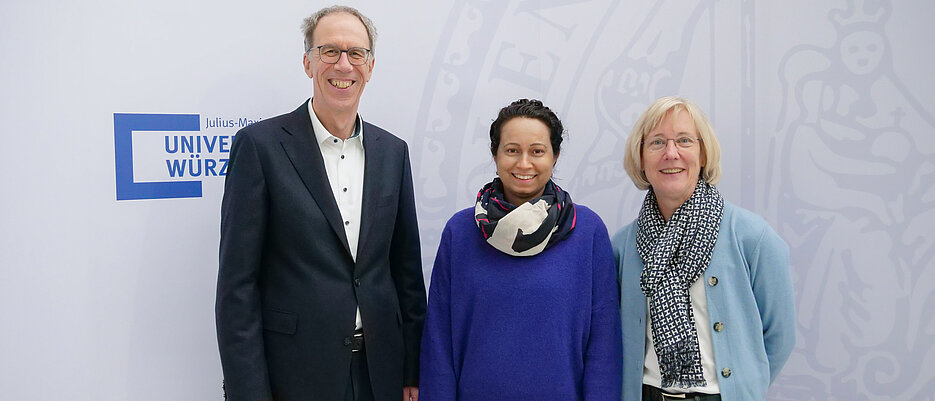Excellence Strategy: Success for the University of Würzburg
02/02/2024One step further: One JMU research project on nucleic acid research and technologies has qualified for the next round in the competition for the prestigious research grant.

The University of Würzburg (JMU) has passed an important milestone of the Excellence Strategy. One of the new draft proposals submitted for the competition in May 2023 convinced an international panel of experts. The joint project with the two Munich universities has thus taken an important step to advance in the race for the prestigious Excellence funding. The Excellence Strategy is the most important research funding programme of the German federal government and state governments – starting in 2026, the annual funding volume will be 687 million euros.
“We are proud of this success“, says University President Paul Pauli. “The fact that one of our research projects was able to impress during this tough scientific competition shows that our university is an internationally recognized location for cutting-edge research. The competition was fierce. Of 143 drafts submitted, only 41 made it through, which translates to less than 30 per cent.“
In the next stage, researchers from the new research project can now submit a full proposal. In addition, the physics department will submit a renewal application for the already funded Cluster of Excellence ct.qmat. Paul Pauli is convinced: “We have the skills and the scientific excellence to overcome this final, decisive hurdle.“
JMU entered the race with five research projects. “The work we have invested in each of these projects is enormous – and in no way in vain, because we were able to deepen existing collaborations and create new ones across disciplinary and university boundaries, “ Pauli explains. “That's why working on these projects remains valuable for the future development of JMU. Our researchers will certainly maintain and cultivate the newly established research collaborations.“
About the research project „NUCLEATE - Cluster for Nucleic Acid Sciences and Technologies“
NUCLEATE is dedicated to the revolutionary field of nucleic acid research and technologies. The mission of the research network is to harness the potential of nucleic acids towards a new understanding of their role in biology and to pave the way into the field of nucleic acid medicine. NUCLEATE thus pursues a nucleic acid-centred approach with a highly interdisciplinary team.
“As part of NUCLEATE, we are exploring fundamental biological principles and mechanisms of action of nucleic acids in the cell in diverse disease contexts,“ explains Würzburg NUCLEATE spokesperson Professor Cynthia Sharma, Chair of Molecular Infection Biology II. “We aim to use these insights to develop new nucleic acid-based biotechnological and biomedical applications.“
“Working together across disciplines at three Bavarian universities and combining our expertise in the field of nucleic acids, strengthens biomedical research in Bavaria in the long term - both nationally and internationally,” emphasises Professor Caroline Kisker, who is coordinating the research project on the Würzburg side together with Sharma and is also Vice President of JMU and Chair of Structural Biology. “We are thus paving the way for nucleic acid-based technologies and medicine.”
NUCLEATE is a joint cluster proposal together with the Ludwig-Maximilians-Universität Munich (LMU) and the Technical University of Munich (TUM).
What is the Excellence Strategy?
The Excellence Strategy is a programme by the German federal and state governments to promote the international competitiveness of German universities. Currently, 57 Clusters of Excellence are being funded within this programme with an annual funding volume of 385 million euros. In the second funding phase, which will begin in 2026, up to 70 Clusters of Excellence can be funded. An annual sum of 539 million euros is available for this purpose.
The deadline for new draft proposals was 31 May 2023. A total of 143 drafts from 59 universities were submitted to the German Research Foundation (DFG). A panel of international experts reviewed these drafts and has now decided that 41 should be developed into full proposals – including the draft from the University of Würzburg.
Full proposals can be submitted until 22 August 2024. New proposals will complete alongside renewal proposals. Among those renewal proposals is the already successful Würzburg-Dresden Cluster of Excellence “ct.qmat - Complexity and Topology in Quantum Materials”. The final decision on which clusters will be funded from 1 January 2026 onwards will be made on 22 May 2025.
On the way to becoming a University of Excellence
A second funding line within the Excellence Strategy is the so-called “Universities of Excellence“. Universities can apply for this funding line if at least two Clusters of Excellence are approved – regardless of whether they have established these individually or in association with other universities. For University President Pauli, the decision taken on 1 February 2024 is an important milestone on Würzburg's path to becoming a University of Excellence: “Even though the final decision on cluster’s full proposals is not due until spring 2025, we will already prepare our University of Excellence application now.“
Further information about the Excellence Strategy can be found on our website.






